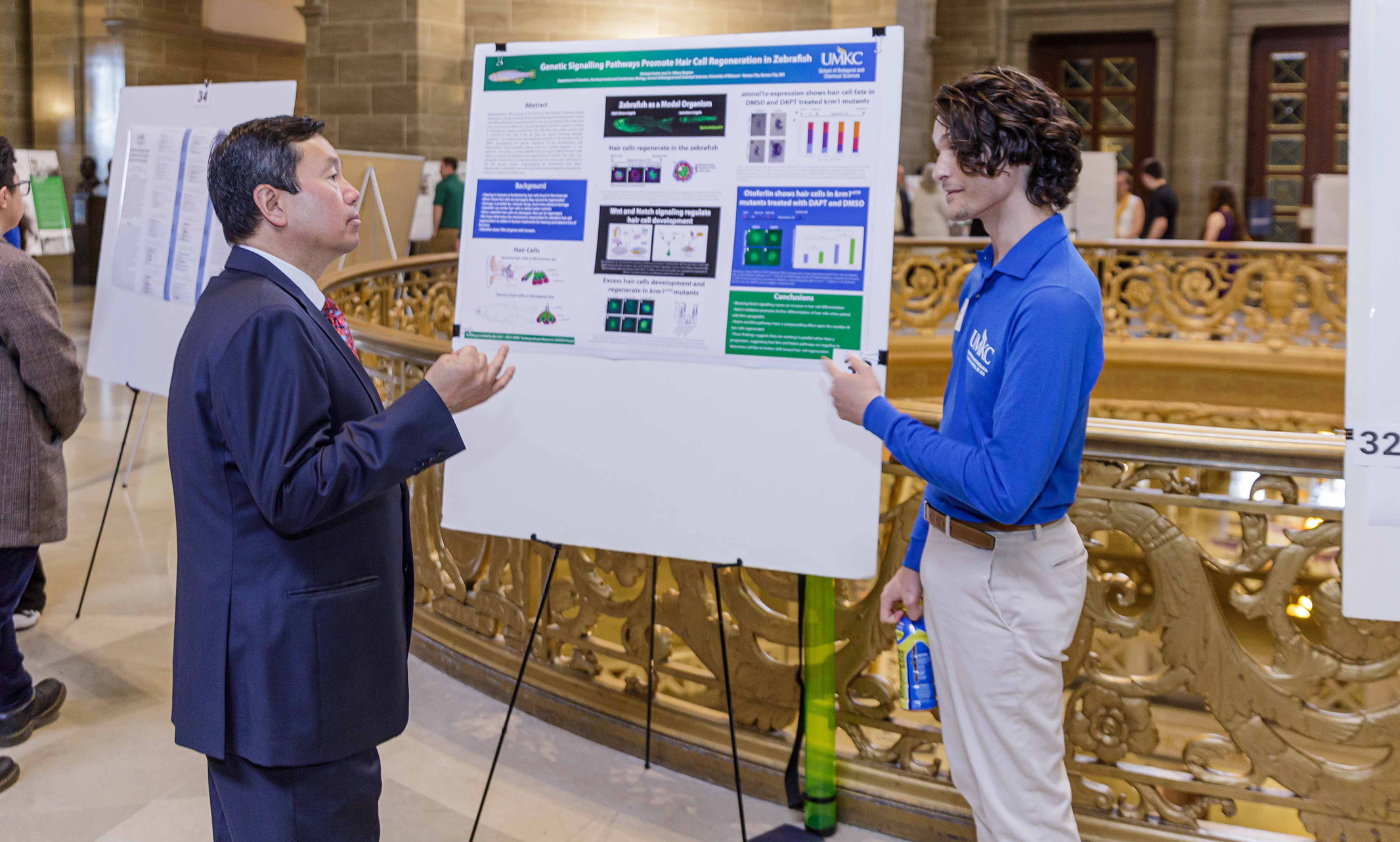After two years of virtual presentations, students from the University of Missouri-Kansas City presented their research in person at the State Capitol in Jefferson City.
The University of Missouri System Undergraduate Research Day featured ten UMKC students, presenting alongside students from the other three UM System schools.
This annual event at the Capitol is a single day devoted to demonstrate to lawmakers in Jefferson City, as well as the public, the unique opportunities undergraduate students have to participate in faculty-mentored research at the four UM System universities.
The featured research projects this year are:
Falls in Older Adults: Preventing Risks with Physical Activity and Cycling
Student: Victor Arellano
Faculty member: Dr. Joseph Lightner
In the United States, adults aged 65 or older (older adults) are at an increased risk of injury from a fall. Reducing an individual’s risk of falling is crucial to avoiding an injury or fatality. Arellano’s study aimed to compare the physical activity (PA) and balance of older adults who regularly cycled to older adults with little to no reported PA and the number of self-reported falls.
Arellano is studying public health.
Impact of COVID-19 Pandemic on Middle Aged and Older Adults’ Physical Activity Levels
Student: Maya Baughn
Faculty mentor: Dr. Amanda Grimes, Nursing and Health Studies
The purpose of Baughn’s study was to qualitatively explore the impact of the COVID-19 pandemic on middle aged and older adults’ physical activity nearly six months into the pandemic. Undergraduate students conducted interviews with adults aged 50+, asking how their activity was impacted due to the COVID-19 pandemic. Approximately 230 interviews were conducted with a diverse sample of participants from the Midwest.
Baughn is studying health sciences.
Xenolith Structures in Welded Basalt Agglutinate Associated with Dotsero Crater, Colorado
Student: Kyle Broley
Faculty mentor: Dr. Alison Graettinger, Earth and Environmental Sciences
The focus of Broley’s study was to gain a detailed understanding of the lava and sediment interactions that occurred at the Dotsero maar volcano in Dotsero, Colorado. These analyses provide answers to thermal impacts and deformation on the localized sediment pieces from the eruption event to gain a deeper understanding of the impacts to the surface sediments.
Broley is studying earth and environmental sciences
Reframing the Narrative: Uncovering Kansas City Women in Jazz
Student: Nina Cherry
Faculty mentor: Dr. Alison DeSimone, Musicology
The jazz canon, formed primarily by white, male scholars of the twentieth century, has neglected and trivialized the careers of women within the genre, especially instrumentalists. Cherry’s research project investigated the historically underrepresented and forgotten women in Kansas City jazz. These women were highly influential to the development of the region’s distinct style, which, in turn, greatly contributed to the city’s growth, although history texts do not reflect this. Her research has been used to create a database of Kansas City women in jazz, Countess.
Cherry is studying music theory.
Student Life Through the Art of Luis Quintanilla: A Study of the Murals in Haag Hall
Student: Victoria Dominguez
Faculty mentor: Viviana Grieco, History; Latin American and Latinx Studies
Dominguez’s research focused on Dr. Clarence Decker’s, President of the University of Kansas City (now UMKC), efforts at broadening the academic scope of the university by appointing prominent international figures to the faculty, like Luis Quintanilla, who established the first fresco painting school in the United States as a resident professor. Dominguez finds her research relevant to Missourians as it shows how higher-education institutions promote cultural engagement through students’ activities within and outside the classroom.
Dominguez is studying spanish and sociology.
The Importance of Yeast in Cancer Research
Student: Jordy Hernandez
Faculty member: Dr. Saul Honigberg, Biology
Hernandez’s research focused on three yeast cyclins, proteins associated with the cycle of cell division, and determining whether mutants in these cyclins affect surrounding cells as well as the cell containing mutations that can form cancer. Yeast is a useful model for cancer cells because it has a short generation time, shares many biological properties with human cells and is relatively simple to genetically manipulate.
Hernandez is studying biology and chemistry
Hair Cell Regeneration in Zebrafish
Student: Michael Kuehn
Faculty mentor: Dr. Hillary McGraw, Biology
In the ear, specialized cells, called hair cells, sense sound. When hair cells are damaged, they fail to regrow, resulting in hearing loss. Aquatic animals have hair cells that sense water current, and in contrast to hair cells in the human ear, they can regrow following damage. Kuehn is investigating the genetic regulation of hair development and regeneration using zebrafish as a model organism. Understanding the mechanisms that allow regeneration in zebrafish hair cells could help human treatment research for hearing or balance function loss.
Kuehn is studying biology and chemistry.
Building a Georeferenced Database for the 1976 Guatemalan Earthquake Rupture of the Motagua Fault System along the North American-Caribbean Plate Boundary
Student: Trenton McEnaney
Faculty member: Dr. Tina Niemi, Earth & Environmental Sciences
In this study, McEnaney sought to relocate sites along the 1976 Motagua fault rupture by analyzing archival material from George Plafker of the U.S. Geological Survey, who was part of the team that collected data on the effects of the earthquake within days of the event. Prior to this project, locating any of these past field sites and points of interest along the 1976 Guatemalan earthquake rupture was hindered by the lack of GPS coordinates. The new database will benefit future paleoseismic and seismic hazard analyses research.
McEnaney is studying earth & environmental science with a geology emphasis.
How Stress Level and Coping Styles Impact Eating Decisions
Student: Grace Nanney
Faculty member: Dr. Oh-Ryeong Ha, Psychology
Nanney’s research analyzed the relationship between problem and emotion-focused coping styles and eating behavior. Participants rated foods based on taste, health, preference and consumption using a computer food rating and choice task and completed a self-report measure concerning factors associated with eating behavior. Participants then completed a self-report measure that ascertained their preferred coping style.
Nanney is studying psychology.

